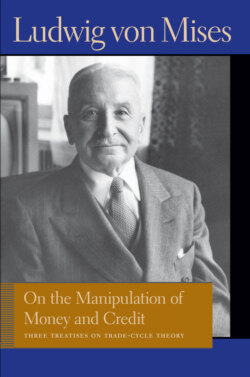Читать книгу On the Manipulation of Money and Credit - Людвиг фон Мизес - Страница 25
На сайте Литреса книга снята с продажи.
5. The Government’s Dilemma
ОглавлениеNevertheless, this is the only method available for the German government to defray the reparations debt. Should it try to raise the sums demanded through loans or taxes, it would fail. As conditions with the German people are now, if the economic consequences of compliance were clearly understood and there was no deception as to the costs of that policy, the government could not count on majority support for it. Public opinion would turn with tremendous force against any government that tried to carry out in full the obligations to the Allied Powers. It is not our task to explore whether or not that might be a wise policy.
However, saying that the decline of the value of the German mark is not the direct consequence of making reparations payments but is due rather to the methods the German government uses to collect the funds for the payments, by no means has the significance attached to it by the French and other foreign politicians. They maintain that it is justifiable, from the point of view of world policy, to burden the German people with this heavy load. This explanation of the German monetary depreciation has absolutely nothing to do with whether, in view of the terms of the Armistice, the Allied demand, in general, and its height, in particular, are founded on justice.
The only significant thing for us, however, since it explains the political role of the inflationist procedure, is yet another insight. We have seen that if a government is not in a position to negotiate loans and does not dare levy additional taxation for fear that the financial and general economic effects will be revealed too clearly too soon, so that it will lose support for its program, it always considers it necessary to undertake inflationary measures. Thus inflation becomes one of the most important psychological aids to an economic policy which tries to camouflage its effects. In this sense, it may be described as a tool of anti-democratic policy. By deceiving public opinion, it permits a system of government to continue which would have no hope of receiving the approval of the people if conditions were frankly explained to them.
Inflationist policy is never the necessary consequence of a specific economic situation. It is always the product of human action—of man-made policy. For whatever the reason, the quantity of money in circulation is increased. It may be that the people are influenced by incorrect theoretical doctrines as to the way the value of money develops and are not aware of the consequences of this action. It may be that, in full knowledge of the effects of inflation, they are purposely aiming, for some reason, at a reduction in the value of the monetary unit. So no apology can ever be given for inflationist policy. If it rests on theoretically incorrect monetary doctrines, then it is inexcusable, for there should never, never be any forgiveness for wrong theories. If it rests on a definite judgment as to the effects of monetary depreciation, then to want to “excuse it” is inconsistent. If monetary depreciation has been knowingly engineered, its advocates would not want to excuse it but rather to try to demonstrate that it was a good policy. They would want to show that, under the circumstances, it was even better to depreciate the money than to raise taxes further or to permit the deficit-ridden, nationalized railroads to be transferred from government control to private hands.
Even governments must learn once more to adjust their outgo to income. Once the end results to which inflation must lead are recognized, the thesis that a government is justified in issuing notes to make up for its lack of funds will disappear from the handbooks of political strategy.
